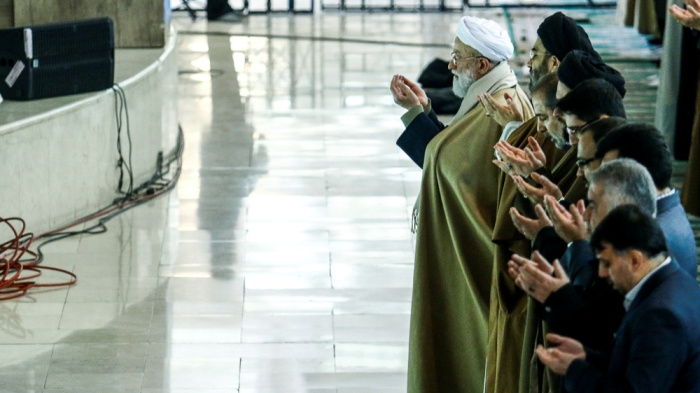Iran’s Friday Prayers: Against the Saudi embassy attack

(Ayatollah Emami Kashani leads the prayers. Photo: Arash Mirsepasi/YJC)
This week, across Iran, the story of Sheikh Nimr's execution, and the ensuing diplomatic turmoil between Tehran and Riyadh dominated the sermons. Leaders of Friday prayers minced no words in slamming the attack on Saudi missions in Iran, the embassy in Tehran, and the consulate in Mashhad, but they were equally sharp-tongued against Riyadh, its decision to execute the Shia figure Sheikh Nimr and to cut off diplomatic relations with Tehran. The level of criticism against the attackers of the embassy seemed to be proportionate to the status of the sermonizer. In Tehran and most major cities, leaders of the prayers were strongly critical of the attack, while in smaller cities few comments were uttered in criticism of the attackers.
In Tehran, Ayatollah Kashani distanced himself from his typical moderate tone to slam attackers on Saudi diplomatic sites, calling them "stupid", though he placed the responsibility mainly on "infiltrators". "In the attack on the Saudi embassy, there was a group orchestrating the event behind the stage that was affiliated with the 'enemy'. They wanted to throw the ball in our court … but stupid people were also involved" he said. Kashani denounced the attack and called for the government, the judiciary and the parliament to follow the case and convict the perpetrators.
In Mashhad, Ahmad Allamolhoda also criticized attackers of the embassy, although with a milder tone. Allamolhoda reminded his audience that "physical intrusion" into a foreign embassy means meddling in the duties of the establishment and against the interests of the Islamic Republic. He instructed the audience to beware of "the enemy's evil plots" and not to pave the way for the enemy through their "revolutionary wrath". He also expressed hope for a full stop to such measures.
In Qom, heart of Iran's seminaries, Ayatollah Hosseini Boushehri, who is the general director of seminaries across the country, addressed the attack on the Saudi embassy in Tehran and its consulate in Mashhad, and tried to detach loyalist forces from the blunder. "This is not what our revolutionaries would do, they would provide no excuses for others," he said. "We do not want such thinks to happen, so the judiciary will be pursuing its duty [to prosecute the attackers], since such actions are against the dignity of the Islamic establishment." Boushehri in the meantime slammed Saudi Arabia, Djibouti and Bahrain for their decision to sever ties with Iran, calling their action a "strategic mistake".
Also in Karaj, west of Tehran, Ayatollah Hosseini Hamedani asked for "vigilance" of "the revolutionary, insightful Iranian nation" so as the enemy does not take advantage of the conditions. Drawing a line between the seizure of the US embassy in 1979 and the attack on the Saudi embassy, he reminded the congregation that circumstances have changed and "Iran today possesses legal institutions and a solid political and social structure" which calls for self-reservation when foreign political developments such as the execution of Sheikh Nimr take place.

